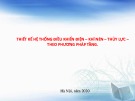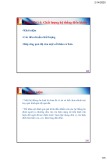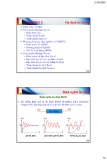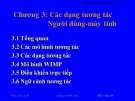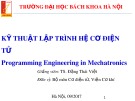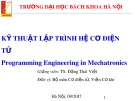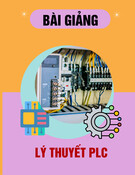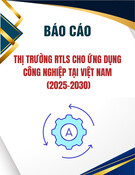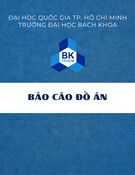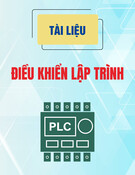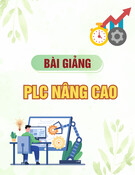LASER VÀ
ỨNG DỤNG
TS. Nguyễn Thanh Phương
Bộ
môn Quang học và
Quang điện tử
Chương IV:
Các loại laser và
ứng dụng
Chương IV: Các loại laser và
ứng dụng
Nhắc lại: những yếu tố cấu thành laser
• • • • •
tương tác giữa ánh sáng và vật chất đảo mật độ tích lũy môi trường khuếch đại thích hợp buồng cộng hưởng quang học tương tác giữa một buồng cộng hưởng quang học và khuếch đại bên trog BCH:
- phương trình tốc độ của laser
- ngưỡng phát laser
bão hòa khuếch đại -
so sánh mode và lọc lựa mode -
-
17/04/2011 3
we now want to get an overview about the different types of lasers, which are practically relevant.
Chương IV:
Các loại laser và
ứng dụng
IV.1. Laser rắn
IV.1. Laser rắn
… Ruby (Rubin) continued
optical and laser properties
of ruby at room temperature
17/04/2011 9
6.3.2. Neodymium LasersIV.1. Laser rắn
Neodymium Lasers
17/04/2011 10
IV.1. Laser rắn
first realized with glass1961, with YAG 1964. •
• crystal
- is the most important material used for solid state laser systems.
stands for , a colourless, isotropic Al2
O12 ions is replaces by Nd3+
from lowest to highest temperature, (growing, grinding, polishing) as well
and
Nd:YAG YAG Yttrium-Aluminum-Garnet, Y3 crystal. For a Nd:YAG laser rod ~1% of the Y3+ ions. The YAG-structure is very stable workability its mechanical stability as the achievable optical quality are good.
absorption spectrum
of Nd:YAG
17/04/2011 11
IV.1. Laser rắn
… Nd:Lasers continued
- - level scheme of Nd:YAG Nd:YAG is a four-level laser, it is homogeneously broadened
fast, non- radiative
decay
-
τ~240µs
atoms
((cid:202) Boltzmann).
-
lasing is mainly supported by the R2 sub-level of the 4F3/2 level. At room temperature ~40% of 4F3/2 are in R2 "strongest" laser transition at 1064.1 nm
- with various
lower laser level is 4I11/2 sub-levels, which all give slightly different emission wavelength.
-
fast, non- radiative
decay
17/04/2011 12
lower laser levels are thermally not populated, so inversion can easily be achieved, even for cw-operation.
IV.1. Laser rắn
• applications
and pulsed lasers) -
material processing (cw welding (Schweißen), marking, writing, drilling (Bohren) (sizes of few µm possible), cutting
illumination and ranging (military) -
medical, especially ophthalmology (Augenheilkunde) -
(e.g. frequency doubled Nd:YAG for pumping of -
(e.g. frequency doubling [532 nm],
pumping of other lasers Ti:Sa lasers) and non-linear optics tripling [355 nm], quadrupling [256 nm], parametric conversion).
-
17/04/2011 13
Nd:glass lasers and corresponding amplifiers are also used for laser fusion experiments
IV.1. Laser rắn
• discharge pumping
- at ~ 810nm or various types of
cw-lasers are pumped by diode lasers discharge lamps or filament lamps, pulsed lasers by flash lamps.
- decays limits quantum efficiency to
heat, which has to be
energy corresponding to non-radiative ~ 76%. Excess power (~24%) is converted into dissipated. Light not absorbed by the pump bands is also partially converted into heat
17/04/2011 14
- examples for pumping cw-Nd:YAG lasers
IV.1. Laser rắn
… discharge pumping continued
arc lamps
-
typical electrical power: ~ 1…10 kW, ~ (100V, 50 A)
-
arc length ~ 50mm
-
lifetimes few 10h … ~ 1000 h
-
which carries the
discharge/filament tube is mounted inside a flow tube coolant (liquid).
- discharge lamps (cw)
filament lamps
-
typical electrical power: ~ 1kW,
-
filament length ~ 50mm
-
lifetimes ~100h
17/04/2011 15
IV.1. Laser rắn
… discharge pumping continued
- used for
are the basis for many of these geometries, where
17/04/2011 17
depending on requested power different "pump cavity" designs are discharge pumped lasers. Elliptical cross sections the discharge tube is located at one focus and the laser rod at the other.
IV.1. Laser rắn
… discharge pumping continued
-
(many GW) and large pulse energies (many joules).
thermal loading pulsed Nd:YAG lasers as well as other solid-state systems can provide very high peak powers Especially if lamps (~ 10 kW electric power each) are used for pumping, thermal loading is a serious, power-limiting of the crystal issue.
Absorption of pump plight outside the pump band, and heating due to non- unity quantum efficiency
through temperature dependence of the •
will induce thermal lensing index of refraction. This modifies the resonator geometry dynamically!
causes birefringence and can even lead to damage of •
thermal stress the crystal.
Reduction of problems arising from thermal loading requires
uniform pumping •
17/04/2011 18
• good heat removal
IV.1. Laser rắn
… discharge pumping continued
- slab geometry
a slab geometry provides a number of advantages over rod-designs:
• pumping is more homogeneous
• larger surface per volume (better heat removal)
• temperature gradients only in y-direction.
⇒
symmetry helps to avoid thermal stress induced problems (laser emissions is already
17/04/2011 20
cartesian depolarization polarized in the y-z plane due to Brewster cut of crystal)
IV.1. Laser rắn
… discharge pumping continued
- different slab geometries exist
single (dual) flash lamp design
17/04/2011 21
multiple flash lamp design
IV.1. Laser rắn
… discharge pumping continued
- disk geometry
beneficial for ultra-high power pulsed solid-state laser systems like those used for laser fusion (at Lawrence Livermore National Laboratory):
- better beam quality
>70cm )
17/04/2011 22
- - - better cooling, larger aperture (∅ better gain uniformity
IV.1. Laser rắn
• diode pumping
-
high pumping efficiency, because diode lasers at 810nm match Nd:YAG absorption bands very well ⇒ reduction of thermal load problems (thermal lensing, thermal
birefringence)
⇒ improved total electrical-to-optical efficiency
-
better pump beam quality: pump laser light can be focused into the gain volume (especially for end-pumped systems)
- (mean time between failure): typically 10.000 h for diode
longer MTBF lasers vs. a few hundred h to about 1000 h for discharge lamps.
-
operation simplified: reduced cooling requirements, no high voltage "spikes", no UV-light which degrades crystal, optics and coolant.
- can provide a few W cw-power (typically not
W up to
17/04/2011 23
a single diode laser fundamental mode). Single transverse mode laser diodes with ~0.1 1 W output power exist. Sometimes broad stripe diode lasers, 1D-arrays ("bars") or 2D-arrays can be used.
IV.1. Laser rắn
… diode pumping continued
there are several geometries for optical pumping with laser diodes -
•
17/04/2011 26
pump light can be matched to mode volume end pumped systems (single and double) -
IV.1. Laser rắn
… diode pumping continued
• side pumping of a rod
-
- direct coupling (diodes close to amplifier) coupling with optics
- fiber coupling (!)
•
17/04/2011 27
achievable: optical cw-pumping at ~10kW, cw-output typical 100W, up to ~1kW
IV.1. Laser rắn
… Nd:Lasers continued
-
physical, optical, thermal properties of Nd:YAG
oscillator (Monolithic
A MISER Isolated Single-mode End-pumped Ring), or alternatively, an NPRO (Non-Planar Ring-Oscillator):
to enforce uni-
the crystal itself constitutes the amplifier, optical resonator, and optical diode directional oscillation.
T. J. Kane I. Freitag et al., Opt. Commun. 115, 511 (1995)
17/04/2011 29
and R. L. Byer, Opt. Lett. 10 (2), 65 (1985) ;
IV.1. Laser rắn
17/04/2011 30
• other solid state lasers
IV.1. Laser rắn
… other solid state lasers continued
Tuning range for various transition metal solid state lasers
17/04/2011 31
large tuning range of Ti:Sa is basis for ultra-short pulse operation
IV.1. Laser rắn
cw-Ti:Sa laser system Coherent MBR 110, tuning range
17/04/2011 32
- further information regarding Ti:Sa lasers see 2.3.4
Chương IV:
Các loại laser và
ứng dụng
IV.1. Laser rắn IV.2. Laser khí
IV.2. Laser khí
• pumping
there are different methods of pumping.
- most common type is based on a continuous or pulsed discharge
- optical pumping (with another laser)
-
faster than some excited
states re-thermalize state: transient inversion between rotational-
gas-dynamical lasers: through fast adiabatic expansion, the gas is transferred to a non-equilibrium state. It approaches a new equilibrium at lower temperature, but for some gases and transitions the lower laying rotational vibrational rotational vibrational vibrational states is generated.
- chemical lasers: inversion is generated through a chemical reaction
•
general features - and pulsed) lasers. (cw
can
17/04/2011 37
gas lasers are among the most powerful However, the beam profile, linewidth, stability, and tuneability typically not compete with dye lasers, solid state lasers, or diode lasers.
IV.2. Laser khí
• the role of collisions
or
collisions (between electrons and laser atoms, between gas atoms between laser atoms and the containing walls) play an important role for gas lasers
- collisions with e- transfer atomic population into the upper laser level.
-
collisions between atoms can transfer energy from one atom of some other atomic species to the laser atoms ("collisions of the second kind")
*
A B A B + → +
Laser
* LASER
These processes are effective if the collision is almost resonant, i.e. the laser atom needs about the same amount of energy for excitation as the atom A can deliver through de-excitation during the collision.
-
17/04/2011 38
can help to transfer atoms from the lower laser collisions with the wall level to the electronic ground state if a spin-flip is required (which can not be provided by a fast radiative (i.e. electric dipole) transition).
IV.2. Laser khí
HeNe
Lasers
17/04/2011 39
Note: we have already discussed the HeNe laser amplifier in sec. 2.3.5.
IV.2. Laser khí
• level scheme (reminder, see 2.3.5)
For further information refer to sec. 2.3.5.
collisions wall with
17/04/2011 40
IV.2. Laser khí
• typical setup
lasers are typically based on capillary discharge tubes. The small -
to the electronic ground state
lasers typically run in fundamental Gaussian
HeNe diameter provides effective de-excitation through collisions with the wall. It further also provides transversal mode selection, so that HeNe mode.
-
Brewster
two concepts for discharge tubes exist: (i) smaller tubes are typically sealed with the end caps formed by the mirrors. There is no user access to the mirrors! (ii) Alternatively separate discharge tubes with windows are used, which provide "polarization selection".
-
17/04/2011 41
the shortest HeNe lasers (~20cm) provide single axial mode oscillation!
IV.2. Laser khí
17/04/2011 42
• common HeNe laser parameters
IV.2. Laser khí
Ar-Ion (Ar+) Lasers
17/04/2011 43
IV.2. Laser khí
• active medium (reminder, see 2.3.5)
transition
wavelength
[nm]
-
discharge parameters: 30-150 A/cm2, ~300 K
-
(wall plug-to-optical) only ~0.1% lasers generate a couple of efficiency →
17/04/2011 44
larger Ar+ 10 kW of thermal load !
IV.2. Laser khí
• applications
- Ar+ for dye lasers lasers have been extensively used as pump lasers
lasers.
by all-solid-state laser system, which are lasers (1064 nm → 532 nm), that
and cw-TiSa They are now being replaced based on frequency doubled NdYag are more compact, much more efficient, cheaper, more stable and typically provide better beam profiles.
- (but see
-
typical Ar+
laser parameters
holography comment above)
-
medical applications (but see comment above)
-
17/04/2011 45
laser light shows (but see comment above)
IV.2. Laser khí
17/04/2011 46
• emission wavelength of various nobel gas lasers
IV.2. Laser khí
Excimer
Lasers
17/04/2011 47
IV.2. Laser khí
• excimers
- are diatomic molecules which do not posses a stable
excimers electronic ground state. They only exist as excited dimers.
-
& laser
emission
because the electronic ground state is unstable, the laser atoms dissociate immediately after they have reached the lower laser level. lasers are effectively four Excimer level lasers with a very fast (~ps) decay from the lower laser level to the system ground state (i.e. two atoms). The lower laser level is effectively unpopulated.
- provide gas laser
KrF, XeF, HgCl,
17/04/2011 48
many dimers activity, e.g. ArF, NaXe, Xe2 Cl, …
IV.2. Laser khí
• excimer lasers
- lasers are typically pumped by excimer
(i)
(ii)
typical discharge volume) and
an electron beam (current 5-50 kA, 5-500 A/cm2) (power a pulsed gas discharge densities of discharge ~ 200 MW/dm3, 1 dm3 emit pulses with temporal width on the order of 10 ns.
- are in the few Hz
repetition rates to ~100 Hz range
- lasers are based on molecular
17/04/2011 49
excimer electronic transitions. Excimer lasers laser activity therefore provide tuneable in the deep blue-to-UV wavelength range (down to below 100 nm)
IV.2. Laser khí
… excimer lasers continued
lasers provide large amplification (~0.1/cm). Typically, excimer -
excimer lasers provide large peak power (MW-GW) and pulse energy (~J).
lasers do not require low loss cavities. -
and
due to large amplification excimer Consequently the emission features poor beam profile quality modest coherence length.
- excimer lasers are or have been used for
pump sources for pulsed dye lasers •
• LIDAR systems (Light Detection And Ranging)
material processing and surface cleaning •
• lasers have also
to generate deep-UV coherent radiation
due to the large peak powers and energies excimer been used in non-linear optics through high-order frequency conversion in laser generated plasmas.
17/04/2011 50
Today these lasers can often be replaced ultra-short (fs) pulse laser systems (e.g. Ti:Sa-based) which provide significantly higher peak powers because their pulses are much shorter.
IV.2. Laser khí
17/04/2011 51
• excimer parameters
IV.2. Laser khí
17/04/2011 52
• common excimer laser parameters
IV.2. Laser khí
CO2
Lasers
17/04/2011 57
IV.2. Laser khí
laser active medium • CO2
is a gas-laser medium which provides vibrational-rotational laser - CO2
lasers
activity. In can be operated in cw- are the most powerful cw lasers as well as in pulsed mode. CO2 cw at all (~100 kW !!)
1351.2 cm-1
(7.5 µm)
(14.9 µm)
-2,…1 or 0
672.2 cm-1 two-fold degenerate, upper index gives resulting angular momentum, l=n2
, n2
(4.2 µm)
2396.4 cm-1
17/04/2011 58
normal modes - N2
IV.2. Laser khí
… CO2 laser active medium continued
- and He. laser is discharge pumped, discharge contains also N2
state is meta-stable)
excitation through N2 is very efficient (it is almost resonant, corresponding N2
upper laser level life time: 1µs … 1 ms
lower laser level is depleted through collisions, especially through collisions with He.
the CO2
(quantum efficiency: 45%, - CO2
17/04/2011 59
laser feature very high efficiency electrical-to-optical efficiency: up to 30%)
IV.2. Laser khí
•
laser parameters
typical CO2
17/04/2011 62
Chương IV:
Các loại laser và
ứng dụng
IV.1. Laser rắn IV.2. Laser khí IV.3. Laser bán dẫn
IV.3. Laser bán dẫn
Semiconductor Lasers
Courtesy of Sacher
Lasertechnik
17/04/2011 64
IV.3. Laser bán dẫn
• general
-
semiconductor lasers rely on solid state physics. Most common type is diode laser, which applies physics of semiconductor diode (pn-junction)
- history: semiconductor lasers were first realized in 1962
-
first semiconductor lasers could only be operated at low temperature, in 1970 first cw-semiconductor lasers were operated at room temperature
- "pro's" of semiconductor lasers
• simple pumping: current injection
• above /ΔPin
500µm for typical
high efficiency: typically the differential efficiency ( ΔPout threshold) is ~50%
• very compact: typical dimension is 100µm × 100µm ×
10mW …100mW (single transverse mode) or up to few 10 W for transverse multimode lasers
17/04/2011 65
• available at almost all wavelength between ~400nm and ~2µm
IV.3. Laser bán dẫn
… pro's of semiconductor lasers continued
•
diode lasers are relatively cheap: diode "chip" ranges between few Euro (i.e. for consumer electronics) and few 1000 Euro, mostly depending on (i) production volume, (ii) wavelength, (iii) power.
diode laser from a laser diode, current and temperature •
to make a stabilization electronics as well as opto-mechanics have to be added (total cost between 10.000 and 20.000 Euro for a scientific diode laser)
•
good tuneability: typically, diode lasers are tuneable by a few % of the central wavelength
17/04/2011 66
• very agile: fast frequency modualtion via current modulation (up to GHz)
IV.3. Laser bán dẫn
- "con's" of semiconductor lasers
-
pour beam quality: elliptic, e.g. 1x3 or larger aspect ratio, and astigmatic, distortion, side lobes
- ~MHz typically, can be reduced by orders of magnitude;
large line width: active stabilization requires large (~MHz) control bandwidth
- to optical, electrical, and electrostatic damage
very sensitive (anyone who has ever build a diode laser has "killed" a laser diode)
- (e.g. ~100 GHz/K and
for a single transverse laser diode at 850nm): for a
level is required and at diode
strong dependence on current and temperature 30 GHz / mA spectroscopy laser temperature stabilization at mK the current source has to be ultra-low noise (typically few µARMS currents of 100mA for a laser diode with few mW output)
17/04/2011 67
most spectroscopy applications require active frequency stabilization ⇒
IV.3. Laser bán dẫn
• principle of operation
- between electrons pumped into the
and holes in the valence band. During this process a
is spontaneously emitted, or is created by a stimulated emission
based on the recombination conduction band photon process.
quasi-Fermi-energy of …
… conduction band
17/04/2011 68
… valence band
IV.3. Laser bán dẫn
… principle of operation continued
- in thermodynamical equilibrium the (quasi-) Fermi related to the
energy ) and of the holes in the valence
) are identical.
the quasi Fermi-energy gives the energy of
electrons in the conduction band (FL band (FV For the conduction band highest laying level which is populated by an electron (T=0 K).
the quasi Fermi-energy gives the energy of
For the valence band highest laying level which is populated by a hole (T=0 K).
17/04/2011 69
If the Fermi-energy lays in between the conduction and valence band, an undoped "semiconductor" is an isolator.
IV.3. Laser bán dẫn
… principle of operation continued
- pn-junction lasers
•
with no voltage applied the quasi- Fermi-levels are degenerate. No inversion is achieved (at T=0K)
pn-junction, no bias
• applied in forward
is generated in >Eg inversion
with voltage direction thermal non-equilibrium is established and the degeneracy of quasi-Fermi-levels is removed in the junction zone. If FL -FV the junction zone, and electrons in the conduction band and holes in the valence band can recombine.
pn-junction, forward bias
•
17/04/2011 70
typical and common semiconductors are GaAlAs (~800nm), InGaAsP (1.3µm -1.5µm), GaInP (670 nm)
IV.3. Laser bán dẫn
… principle of operation continued
•
front and rear end of the semiconductor can provide the optical feedback if appropriately reflection coated. Then the laser diode provides laser operation and can be considered a diode laser.
•
17/04/2011 71
especially in spectroscopy applications at least one of the ends is AR-coated and feedback is provided by external, frequency selective elements. Then, the chip functions as an amplifier only and should be termed laser diode
IV.3. Laser bán dẫn
• pumping
different methods of pumping semiconductor lasers exist
- optical pumping
- (with high energy
electron beam pumping electrons generated by electron gun)
-
current injection (term: injection laser or diode laser) This is the most common application
17/04/2011 72
Inversion can be created in a thin layer (~1µm) of the pn-junction. Laser emission therefore always features large divergence angles (few 10 deg HWHM) at least in the direction normal to the junction.
IV.3. Laser bán dẫn
• homojunction lasers
- and n-doped zones of identical semiconductor material; first
consist of p- laser diodes realized
- current density of is ~100kA/cm2 lasers
threshold homojunction at room temperature, at room temperature operation therefore only in pulsed mode
lasers can be operated in cw-mode at low
Homojunction temperatures (few 10 K)
lasers were soon replaced by heterojunction lasers,
17/04/2011 73
Homojunction where different host material was used for the different layers
IV.3. Laser bán dẫn
• gain-guided double heterostructure lasers
-
As-GaAs As Alx
two structure boundaries are used: Ga1-x Aly to reduce threshold current (density) and GaAs-Ga1-y
this design -
(i)
avoids diffusion of electrons and holes out of the active area so that the active zone is better localized ⇒ threshold current is reduced
(ii)
As confinement for the vertical direction due Alx
provides a wave guide like the relatively larger index of refraction of Ga1-x optical loss in non-active region is reduced ⇒
threshold current is reduced threshold current density ~1 kA/cm2
(iii)
17/04/2011 74
thin (~10µm) wide top electrodes confine the gain region in horizontal direction, so that transverse single mode operation can be achieved (gain-guiding)
IV.3. Laser bán dẫn
17/04/2011 75
… gain-guided double heterostructure lasers continued
IV.3. Laser bán dẫn
• index-guided double heterostructure lasers
- confined in horizontal direction by a diode oriented such
the active region is that it is biased in reverse direction under operating conditions.
provides
This forces the injection current into the active region, and it wave guide like confinement in the horizontal direction. Both decreases threshold current (density)
lasers have proven to work well. They
and feature transverse single
17/04/2011 76
Index-guided heterostructure provide threshold currents as low as 10 mA mode operation.
IV.3. Laser bán dẫn
• quantum well heterostructure lasers
- of very thin heterostructure sandwich
As, each structure ~5nm). Alx
quantum well lasers use a multilayer layers (e.g. GaAs-Ga1-x This way the active area is confined vertically to ~30nm, which is less than the de-Broglie wavelength of the electrons
at room
17/04/2011 77
This design further reduces the threshold current. Threshold current is less dependent on temperature, so that quantum well lasers can also provide high output powers (~100mW, single transverse mode) temperature.
6.4. Semiconductor Lasers
• Distributed Bragg Reflector (DBR) lasers
- by
transverse single mode operation of diode lasers can be achieved transverse and horizontal confinement (gain-guiding, index-guiding, ridge waveguides)
lasers use an on-chip periodic structure outside the active region -
(Bragg diffraction) and selects one
typical
emission
spectrum
reflector section
burried grating
gain section
metallization
ridge waveguide
17/04/2011 78
DBR which acts like a volume phase grating wavelength (longitudinal mode) for operation.
IV.3. Laser bán dẫn
• Distributed Feedback (DFB) lasers
-
and selects one wavelength
DFB (Distributed Feed Back) laser use an on-chip periodic structure inside the active region which acts like a grating (longitudinal mode) for operation.
typical
spectrum
metallization
burried grating
ridge waveguide
emission
provide single mode operation without any additional -
17/04/2011 79
DFB and DBR external elements, but they can by far not be coarsely tuned as well as extended cavity diode lasers (sometimes also called: “external cavity DL” ).
IV.3. Laser bán dẫn
• single-frequency diode lasers: Littrow lasers
- for spectroscopic applications lasers have to be operated in single-
mode
frequency mode, i.e. in single axial and transverse mode. Gain-guided and index guided double heterostructure lasers guaranty TEM00 operation, but single axial mode frequency selective components (also: “external”) cavity.
operation has to established through in an extended -
the most simple approach is the "extended cavity" diode laser design, where light is fed back from a grating in Littrow configuration ((cid:202) 6.2)
grating in Littrow configuration
grating has large line density so that
only one diffraction order exists •
•
for a given orientation of the grating the first diffraction order is diffracted right back into the diode laser only for one specific wavelength (typically 30%)
short focal length (few mm) lens with large numerical aperture (0.5..0.6)
17/04/2011 81
• 0-order provides laser output
IV.3. Laser bán dẫn
… single-frequency diode lasers: Littrow lasers continued
- the Littrow wavelength follows from the grating equation
6.4-1 sin sin = + θ θ
IN
OUT
λ d
the incidence angle and the exit angle of the and ΘOut
where λdenotes the wave length, d the distance between two adjacent grating lines, and ΘIN first diffraction order.
For a Littrow setup the geometry requires so that θ θ=
IN
OUT
sin , = = θ θ θ IN
OUT
λ d 2
2 d λ ~
17/04/2011 82
so that, if Θ~45 deg is required, then For a 850 nm laser this corresponds to 1660 lines / mm
IV.3. Laser bán dẫn
… single-frequency diode lasers: Littrow lasers continued
-
is
~ 1/L3
1 MHz (over 1..10 ms), the
the extended cavity design reduces the laser linewidth: as the cavity length is increased (from few 100µm to few cm) the intrinsic laser linewidth decreased according to ΔνLASER A typical grating laser line width is 100 kHz – intrinsic linewidth is significantly smaller (in the kHz range)
- in a grating setup is a
continuous tuning range of AR-coated laser diode few GHz, with special mechanical design 50 GHz…100 GHz. With special care taken for mechanical tuning, tuning of current (and temperature) the diode laser can provide continuous scanning all through its gain bandwidth.
- in a grating setup
absolute tuning range of AR-coated laser diodes depends on laser diode, but will typically be ~1-5% of central wavelength.
17/04/2011 83
Non-AR coated laser diodes have to be temperature tuned for wavelength tuning, and achieve significantly smaller absolute tuning ranges.
IV.3. Laser bán dẫn
… single-frequency diode lasers: Littrow lasers continued
Lasertechnik
Courtesy of Sacher
17/04/2011 84
IV.3. Laser bán dẫn
• single-frequency diode lasers: Littman lasers
- design is an alternative external cavity design.
the first diffraction order is retro-reflected by an
the Littman In the Littman setup additional mirror. Frequency tuning is now achieved by tilting the planar retro-mirror.
- Littman setups
• make use of the grating twice, i.e. the grating provides larger selectivity
17/04/2011 85
• the output beam does not move as the laser is tuned
IV.3. Laser bán dẫn
… single-frequency diode lasers: Littrow lasers continued
Courtesy of Sacher
Lasertechnik
17/04/2011 86


